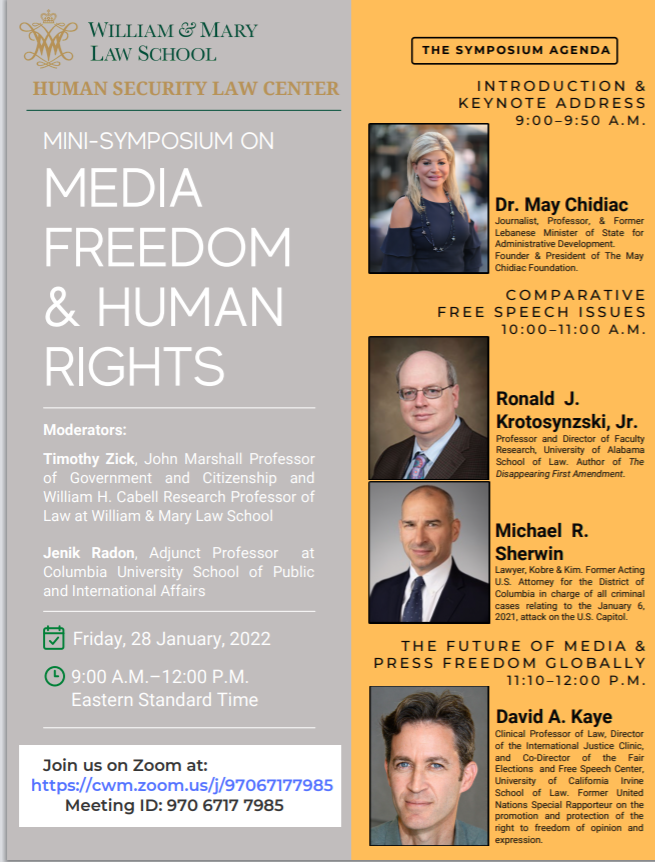Past Events
2022-2023 Academic Year
Extreme Punishment with Steven Epstein
On January 24, 2023, Human Security Law Center and the Criminal Law Society hosted Steven Epstein, to discuss his book, "Extreme Punishment". Click this link to read a full summary of the event.
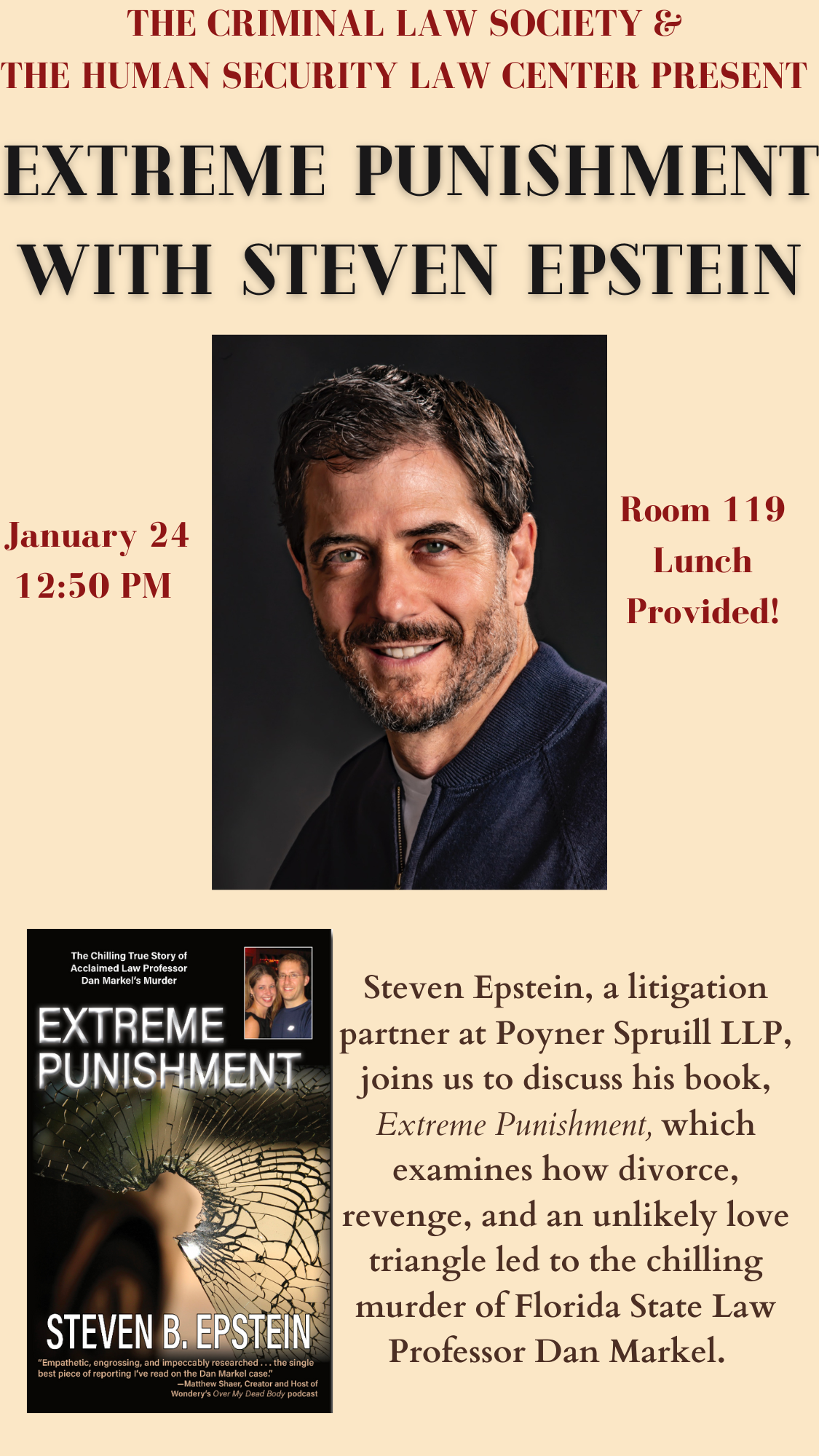
Press Freedom Under Attack: 21st Century Threats to Journalists - and Democracy.
Human Security Law Center hosted its Fall Symposium November 4, 2022, in conjunction with William & Mary's Reves Center. The symposium welcomed various world-renowned journalists and documentary directors to discuss present-day threats to journalism and democracy.
For a detailed summary of the Keynote Speaker, Tikhon Dzyadko's, views on journalism today, click this link.
For a detailed summary of the discussion with directors and journalists from HBO's "Endangered", click this link.
For a detailed summary of the discussion with the senior director and co-founder of the Virginia Center for Investigative Journalism, Christopher Tyree, click this link.
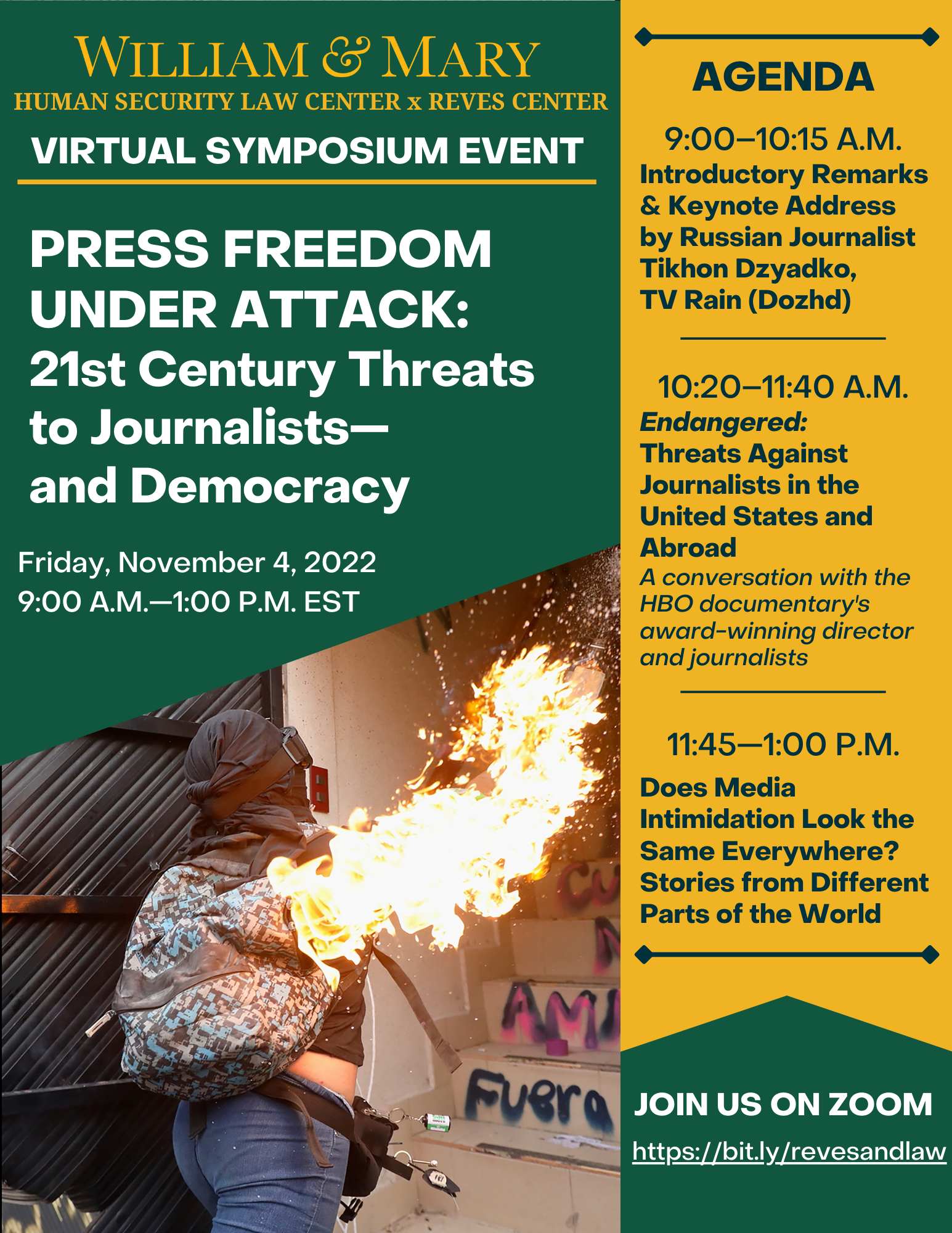
Becoming Evil: How Ordinary People Commit Genocide and Mass Atrocity.
Dr. James Waller Speaks About the Psychology of Mass Atrocity Crimes with William & Mary Law School's Human Security Law Center and Criminal Law Society.
On October 5, 2022, the Human Security Law Center and the Criminal Law Society at William & Mary Law School hosted Dr. James Waller, Cohen Professor of Holocaust and Genocide Studies at Keene State College in New Hampshire and Director of Academic Programs with the Auschwitz Institute for Prevention of Genocide and Mass Atrocities (AIP).[1] Dr. Waller, a psychologist by training, specializes in understanding genocide, war crimes, and mass atrocity from a psychological perspective. Speaking to a filled lecture hall, Dr. Waller presented his research on the psychology of the on-the-ground perpetrators of these mass atrocity crimes. His presentation, “Becoming Evil: How Ordinary People Commit Genocide and Mass Atrocity,” is based on the book he authored of the same name.
How do people commit genocide and mass atrocity? Observing the crowded room of attendees, who were mostly law students, Dr. Waller advised the audience to “turn off your legal lens” and approach the next hour exploring this complex question through a psychologist’s perspective. He began this exercise by showing a video captured in Latvia during World War II, one of the rare pieces of footage depicting crimes against humanity during that time. German armies had conquered the country and had begun rounding up those viewed as racially unacceptable—mostly Jews—and those not sympathetic to Nazi policies—mostly communists. The video first showed people wearing identifying armbands being led out of trucks. The victims were then lined up in a freshly dug ditch and shot from behind. Bystanders looked on, and those who had not yet been killed waited patiently in line, craning their necks for a better view of their fate. According to Dr. Waller, as many as 1.5 million people were killed during World War II in these intimate, face-to-face executions.
After the video, Dr. Waller posed questions that might arise from a psychologist’s perspective: Why did the victims wait patiently in line? What was going through their mind? How did the spectators process what they were seeing? What did the perpetrators believe they were doing? What did they tell themselves to justify their actions?
To answer these and related questions, Dr. Waller has viewed and studied footage like the Latvian video, and he has collected the accounts of 225 alleged or convicted perpetrators of mass atrocities, the accounts of surviving victims, and trial and interrogation testimonies. These studies have led him to Germany, the Great Lakes region of Africa, Latin America, Bosnia and Herzegovina, and beyond.
Dr. Waller then turned to a more recent atrocity: the Rwandan Genocide of 1994, where roughly 800,000 people lost their lives in a 100-day period, in a country the size of Vermont. He then described one of his interviewees, a Rwandan woman who survived a massacre that took place at a church in a village outside the capital, Kigali. The woman—still physically and emotionally scarred from the event—did not wish to reenter the church itself.
Dr. Waller described how she recounted the horrors of that day. She had been in the back of a church, near a window that was blown out by a grenade. She was cut deeply from the front to the back of her neck with a machete. As people were being killed around her, she escaped through the blown-out window and crawled to the back side of a nearby Sunday school building. Lapsing in and out of consciousness, she recalled hearing slapping noises. She realized later that these noises turned out to be sounds of impact—the repetitive impact of men slamming children’s heads into a brick wall inside of the school. Roughly 125 children would be murdered there. The bricks remain stained to this day.
Again, Dr. Waller posed questions that might occur to a psychologist: Why did the killers kill in this specific way? Who were the perpetrators? Volunteers proposed that the killers were utilizing a cheap alternative to firearms or machetes or used their strength as a show of force and control over the conflict. Dr. Waller then described the perpetrators—ordinary men caught up in a brutal ethnopolitical conflict.
To demonstrate just how ordinary these perpetrators were, Dr. Waller then recounted interviewing one of the individuals who had taken part in the massacre at the church that day. The man Dr. Waller interviewed had grown up in the same village as his victims. He was a member of the church’s congregation and had even attended church just two weeks before the massacre. He was the village’s equivalent of a grade-school teacher and someone who enjoyed playing football (known as soccer in America). Villagers described him as a wonderful father and doting son. Shockingly, some of the children this man killed were his own students and those he played football with.
When Dr. Waller asked the man why he had done those acts, the man responded, “I lost myself. I did not know who I was.” This, Dr. Waller described, was a coping mechanism that reveals how perpetrators manage to answer and tolerate how they committed the unimaginable.
Dr. Waller explained that his research centers on the rank-and-file perpetrators, those who––due to their sheer number––often are not brought to justice. Dr. Waller does not focus on the “architects” or “bureaucrats” of genocide, because, by and large, they never kill anyone face to face. The aftermath of these conflicts often leaves what remain of justice systems woefully unequipped to deal with the task of bringing every perpetrator to justice. Some of today’s Serbian police force, for example, consists of ex-perpetrators of the genocide at Srebrenica as well as other massacres during the Yugoslav Wars of 1992-95, according to Dr. Waller.
Dr. Waller then highlighted his central research question: who are the people who perpetrate atrocities and how are they enlisted to perpetrate such extraordinary evil? “Can one recapture the experiential history of these killers––the choices they faced, the emotions they felt, the coping mechanisms they employed, the changes they underwent?”[2]
There is a danger in this line of thought, Dr. Waller explained. One should not sympathize with the perpetrators or find excuses for their acts; understanding must be separated from excusing or forgiving. In discussions with perpetrators, Dr. Waller hunts for the coping mechanisms used by these individuals to help them sleep soundly at night.
What, then, are the arguments for the ordinary origins of extraordinary human evil? Dr. Waller discussed how some critics perceive that extraordinary evil originates from extraordinary causes. This gives rise to the “Mad Nazi” theory—people usually hope for some evidence that perpetrators are somehow unintelligent or mentally unhealthy. Unintelligence can be addressed, and pathological issues offer easy explanations for acts of extraordinary evil. Yet, Dr. Waller explained that this theory has been debunked. He highlighted the psychological assessments of twenty-two Nazis involved in the Nuremberg trials. These assessments, which included IQ and Rorschach tests, demonstrated that the Nazi perpetrators exhibited normal and high levels of intelligence and were mentally healthy.
Dr. Waller asserted that extraordinary evil often comes from ordinary sources. It is ordinary, everyday people who commit genocide and mass killing. This, Dr. Waller expressed, is a difficult argument to swallow. Most ordinary people do not want to believe that they could commit acts of such evil. This makes the challenge of preventing future genocides difficult; if ordinary people are usually the culprits, then no person or society is immune to these dangers.
How, then, do ordinary people come to commit genocide and mass killing? Dr. Waller offered some explanations: cultural constructions of worldviews contribute to group-based identities. Socially dominating sources of authority can also change how ordinary people view others. A group’s construction of the “other” and “us-them” mental reorientation also play a role; such justifications demonstrate that perpetrators usually do not abandon their morality entirely. Rather, perpetrators only focus their morals on those who are within their group or culture.
Dr. Waller explained how victim-blaming also plays a role. In an interview with a Holocaust perpetrator, Dr. Waller recalled how the man showed regret for his actions throughout the discussion. Just before the interview ended, however, the perpetrator claimed, “But you have to remember that the Jews were going to take over the world.” Finally, Dr. Waller elaborated on the social construction of cruelty; professional socialization, group identification, and repression of conscience all contribute to any societal structure slowly influencing those who are in it.
Addressing questions from the audience, Dr. Waller tied the psychological perspectives of the perpetrators with an assessment of the legal framework of intent. He explained that prosecutors tasked with addressing multiple charges of atrocity crimes will avoid pursuing the charge of genocide for a rank-and-file perpetrator due to the unreasonably high burden of intent that must be overcome to succeed in conviction. Many killers, Dr. Waller claimed, lack the intent to wipe out entire peoples or cultures. Instead, perpetrators often admit to baser motives––justifying killings for money, land, livestock, and the like.
Dr. Waller also emphasized that—given his research findings—genocide prevention is not merely a foreign-policy issue for the United States or other Western countries. No nation is immune to these challenges, so domestic policy should also be shaped to help prevent these crimes.
[1] The Auschwitz Institute for Prevention of Genocide and Mass Atrocities (AIP) is an international non-profit organization that has trained over 9,000 government officials and employees in over 90 countries in long-term genocide and mass atrocity prevention.
[2] Christopher R. Browning, Ordinary Men: Reserve Police Battalion 101 and the Final Solution in Poland 27 (1992).
Written By: Mark Wilson, J.D. ‘25
Edited By: Rachel Sleiman, J.D. '23
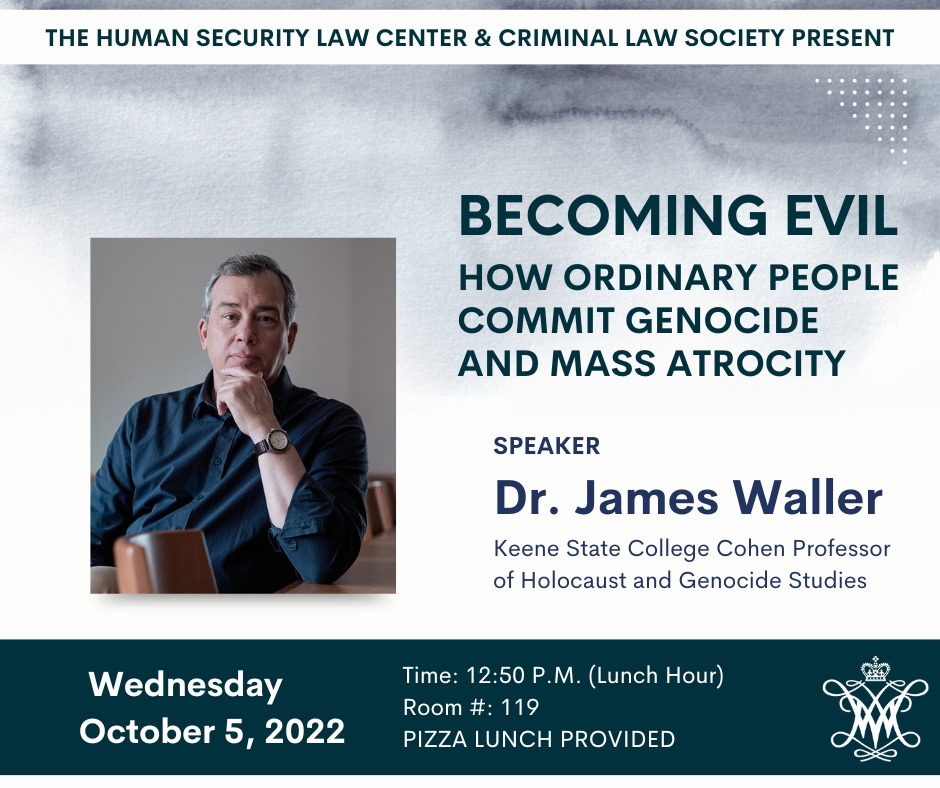
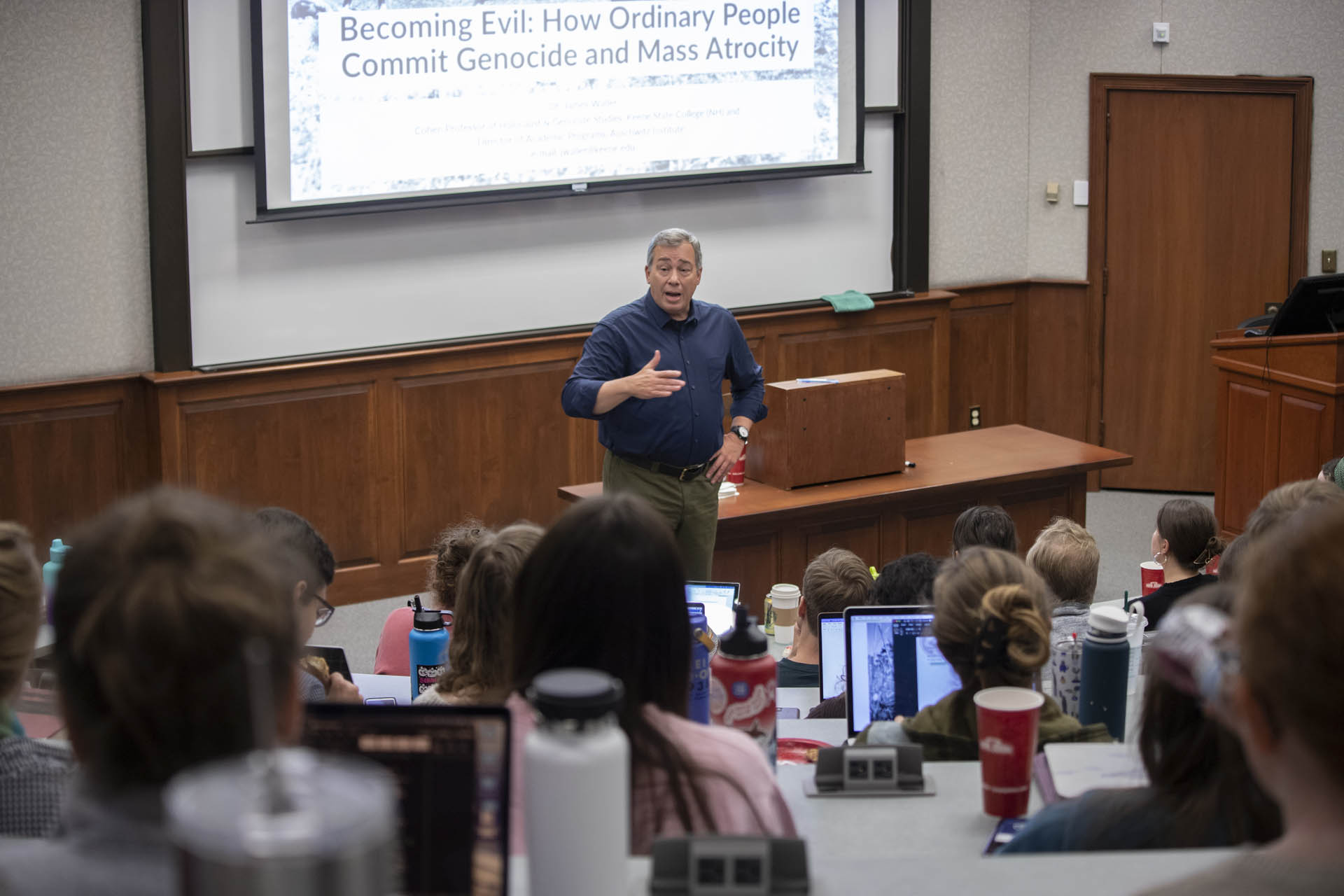
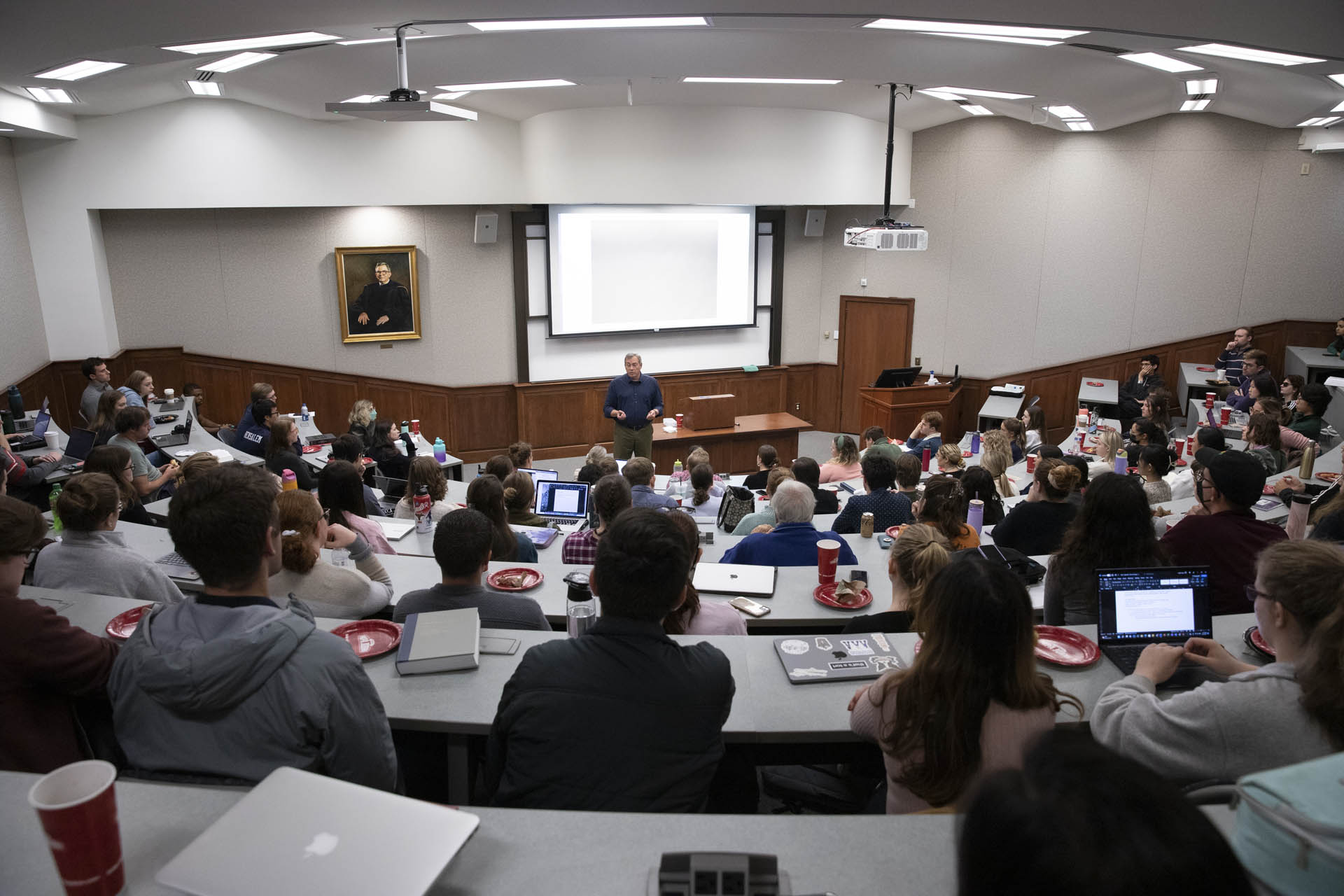
2021-2022 Academic Year
Police Bystander Liability: A Comparative Approach
On April 14, 2022, the Human Security Law Center at William & Mary Law School hosted a presentation by renowned legal scholar Göran Sluiter, Professor of International Criminal Law at the University of Amsterdam. Professor Sluiter is also a Professor of Criminal Law and Procedure at Open Universiteit in The Netherlands and a practicing lawyer and partner at the firm Prakken D’Oliveira Human Rights Lawyers. Professor Sluiter’s presentation is part of his ongoing research project, “Rethinking the Outer Limits of Secondary Liability for International Crimes and Serious Human Rights Violations." The presentation discussed the legal liability of police officers who witness incidents of police brutality and fail to intervene. Click here for the full summary of Professor Sluiter's talk.
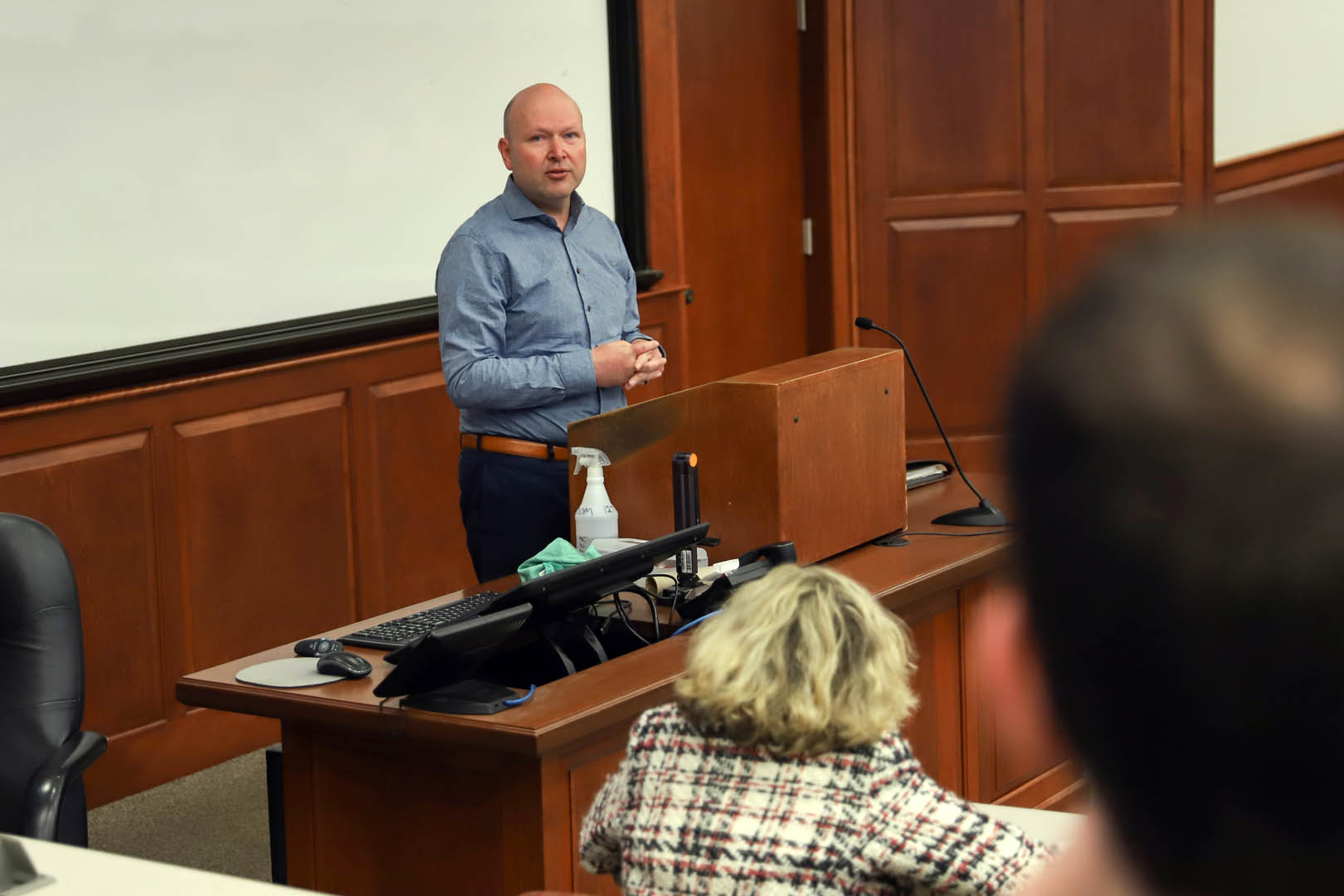
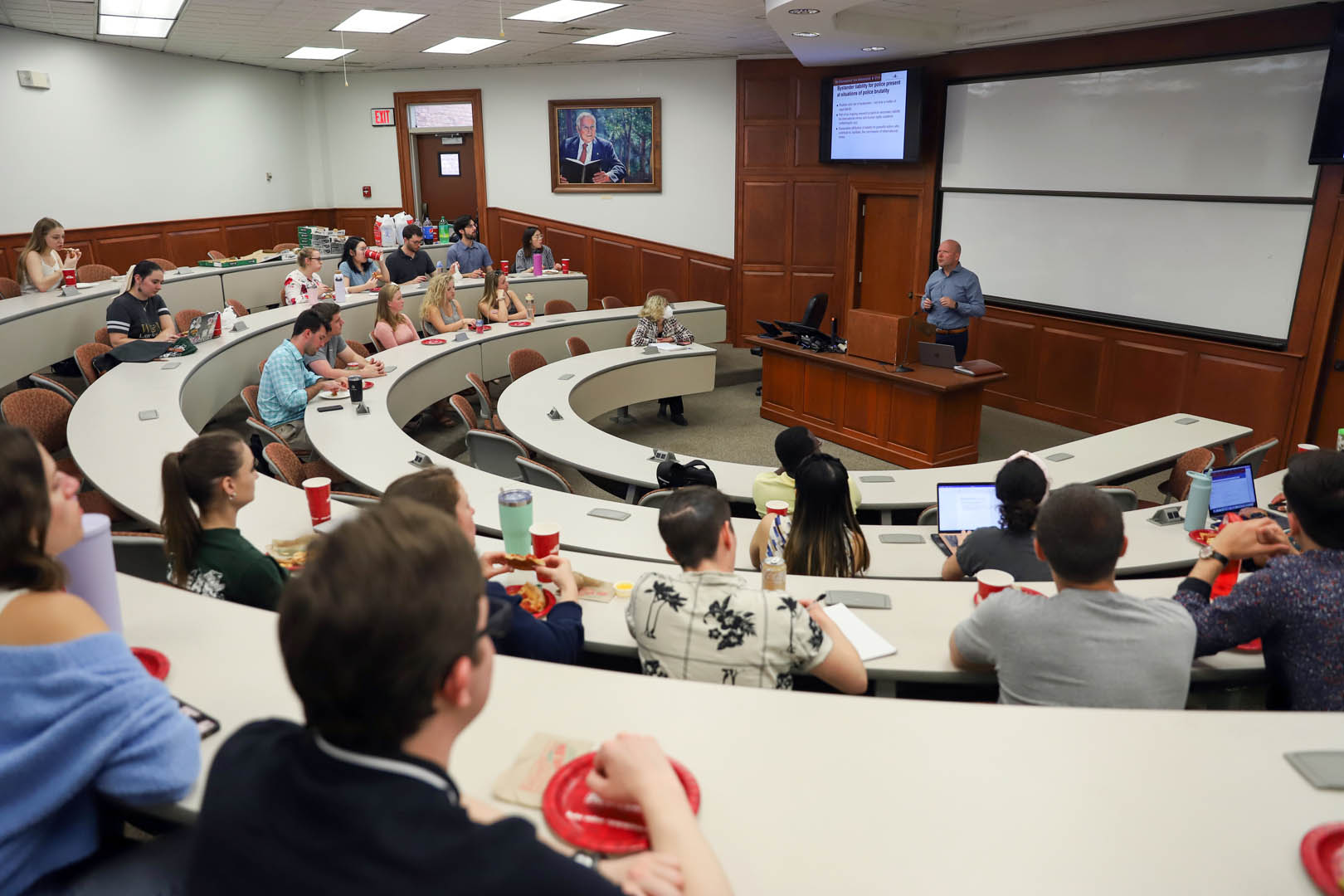
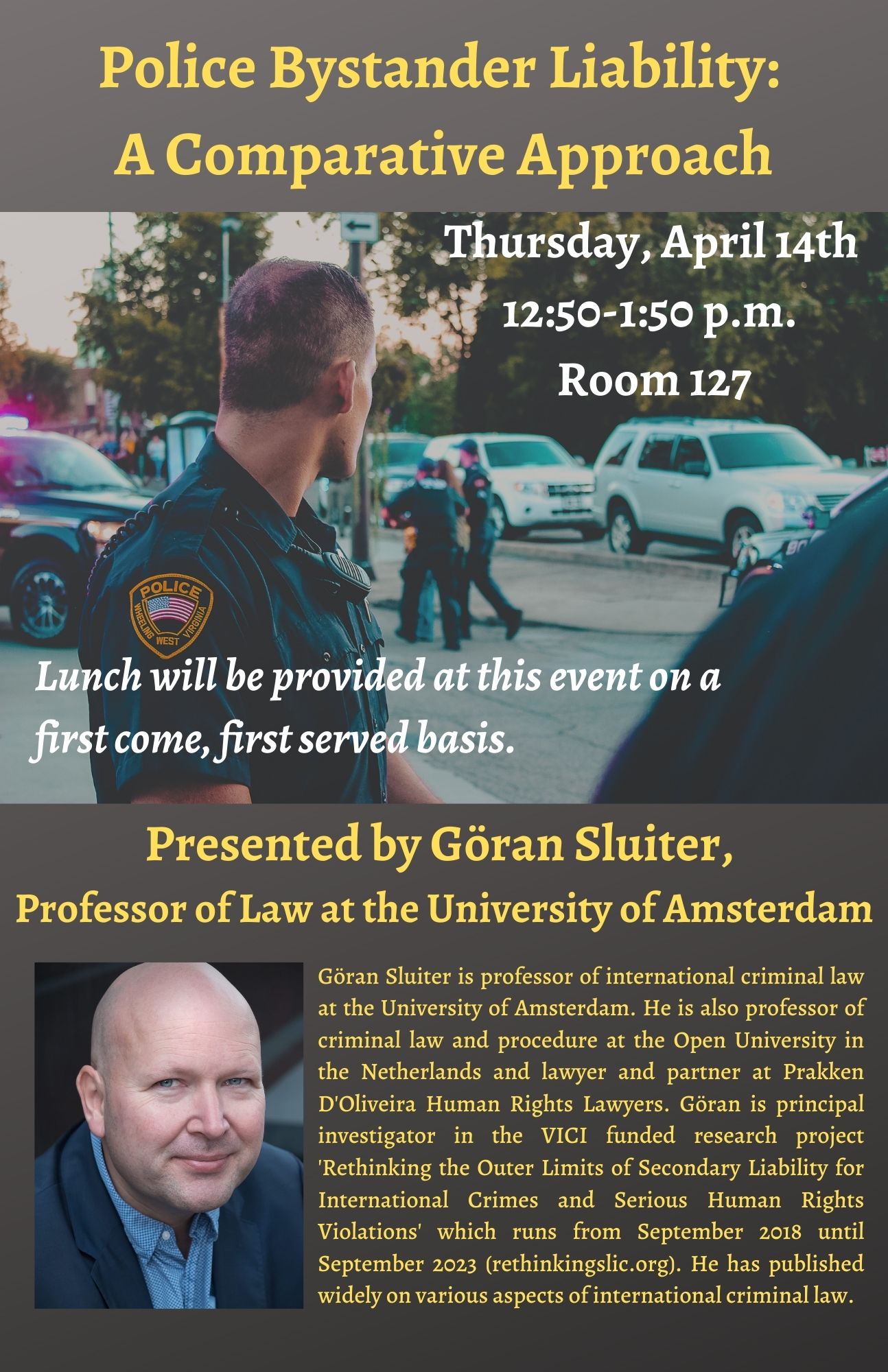
Media Freedom & Human Rights - Mini Symposium
On Friday, January 28, 2002, the Human Security Law Center at William & Mary Law School hosted a symposium on Media Freedom and Human Rights. Keynote speaker, Dr. May Chidiac, inspired the audience by recounting her continuing struggle for journalistic freedom following a car bomb assassination attempt that she only miraculously survived (following more than 40 surgeries). University of Alabama Law School Professor Ron Krotosynzski discussed transborder speech whereas former US Attorney for the District of Columbia Michael Sherwin addressed the First Amendment issues arising from the Summer 2020 protests and the January 6th attack on the Capitol. These events implicated the line between “freedom of expression” and criminal culpability. Finally, U.C. Irvine Law School Professor David Kaye, who is former United Nations Special Rapporteur on the Promotion and Protection of the Right to Freedom of Opinion and Expression, explored Media Freedom globally, focusing on the ways in which we might conceptualize human rights and the media, access to information, and speaker/audience rights.
Making Ecocide an International Crime
On Tuesday November 23, 2021, the Human Security Law Center at William & Mary Law School hosted a presentation by Kate Mackintosh, the inaugural Executive Director of the Promise Institute for Human Rights at the University of California-Los Angeles School of Law, about recent efforts to establish ecocide as an international crime and in particular as the fifth international crime within the jurisdiction of the International Criminal Court (ICC). Read more about Ms. Mackintosh’s talk and the effort to make ecocide an international crime at The Comparative Jurist.
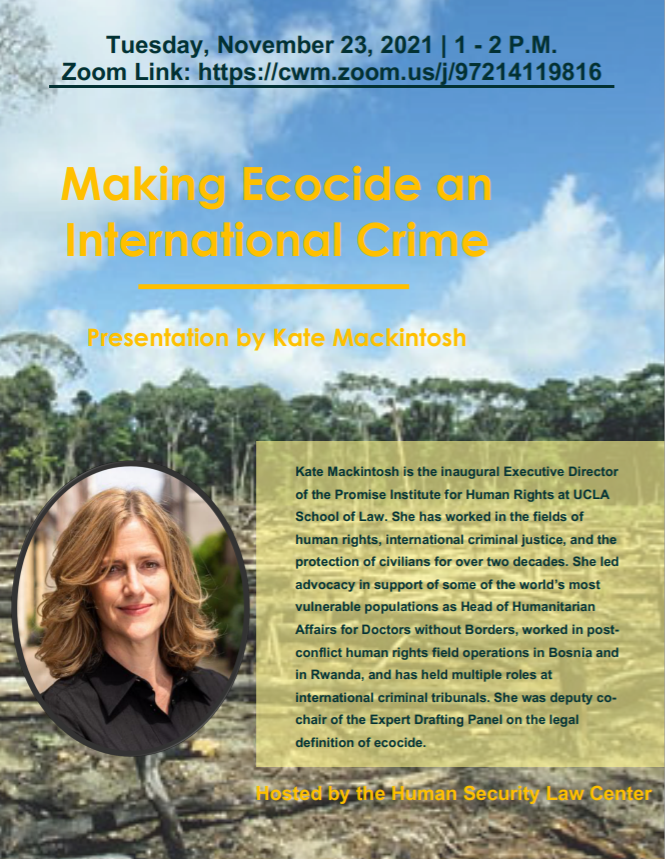
Exposing Collaborators
In September 2021, the Human Security Law Center welcomed Barbara Holà and Mark Drumbl to discuss their research and new book about informers in repressive regimes. The speakers discussed particular emotions that they believe are the underlying reasons for why people inform on their friends, neighbors, coworkers, and even family members. The event then discussed the role transitional justice should, or should not play, in restoring trust in the community after the repressive regime has fallen.
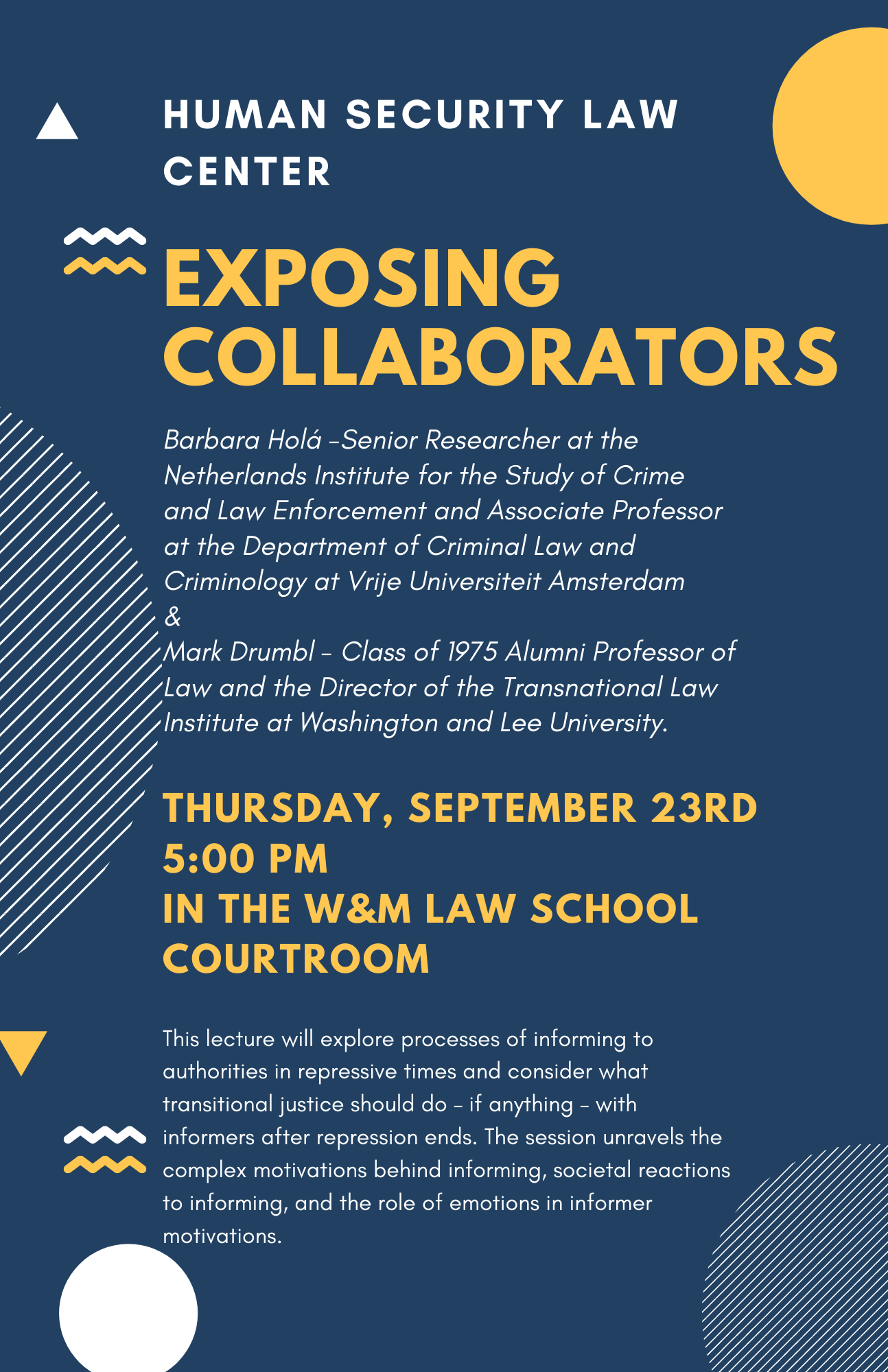
2020-2021 Academic Year
New Year, New US?: Potential Atrocity Crime Policy Changes Under President Biden
In February 2021, the Human Security Law Center welcomed Arthur Traldi, an international criminal prosecutor, to discuss potential crime policy changes under the Biden administration.
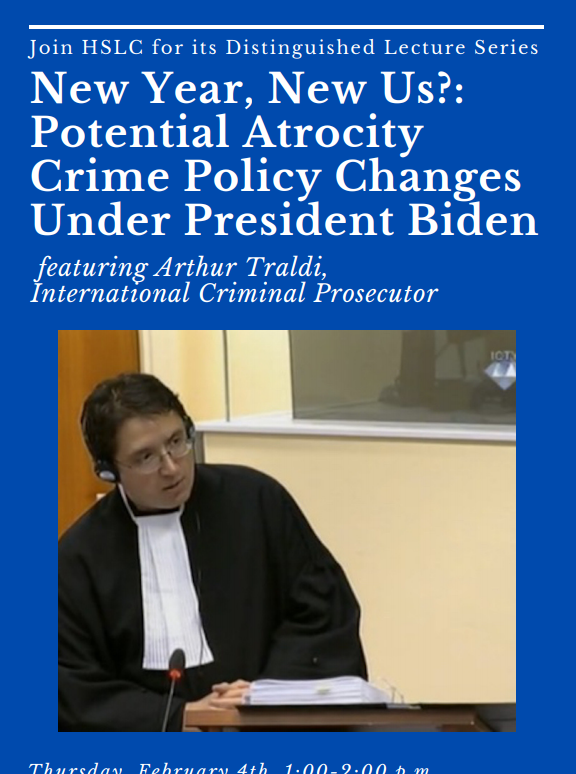
Peter Robinson: The Lead Counsel for the Defense Team of Paul Rusesabagina
In November 2020, the Human Security Law Center had the privilege of welcoming Peter Robinson, the lead counsel for the defense team of Paul Rusesabagina. Paul Rusesabagina is best known as the protagonist in the award-winning movie, Hotel Rwanda. In his career, Robinson has also defended persons accused at the International Criminal Court and the international war crimes tribunals for Rwanda and the former Yugoslavia. Prior to working internationally, Robinson was an Assistant United States Attorney and a criminal defense lawyer in California.
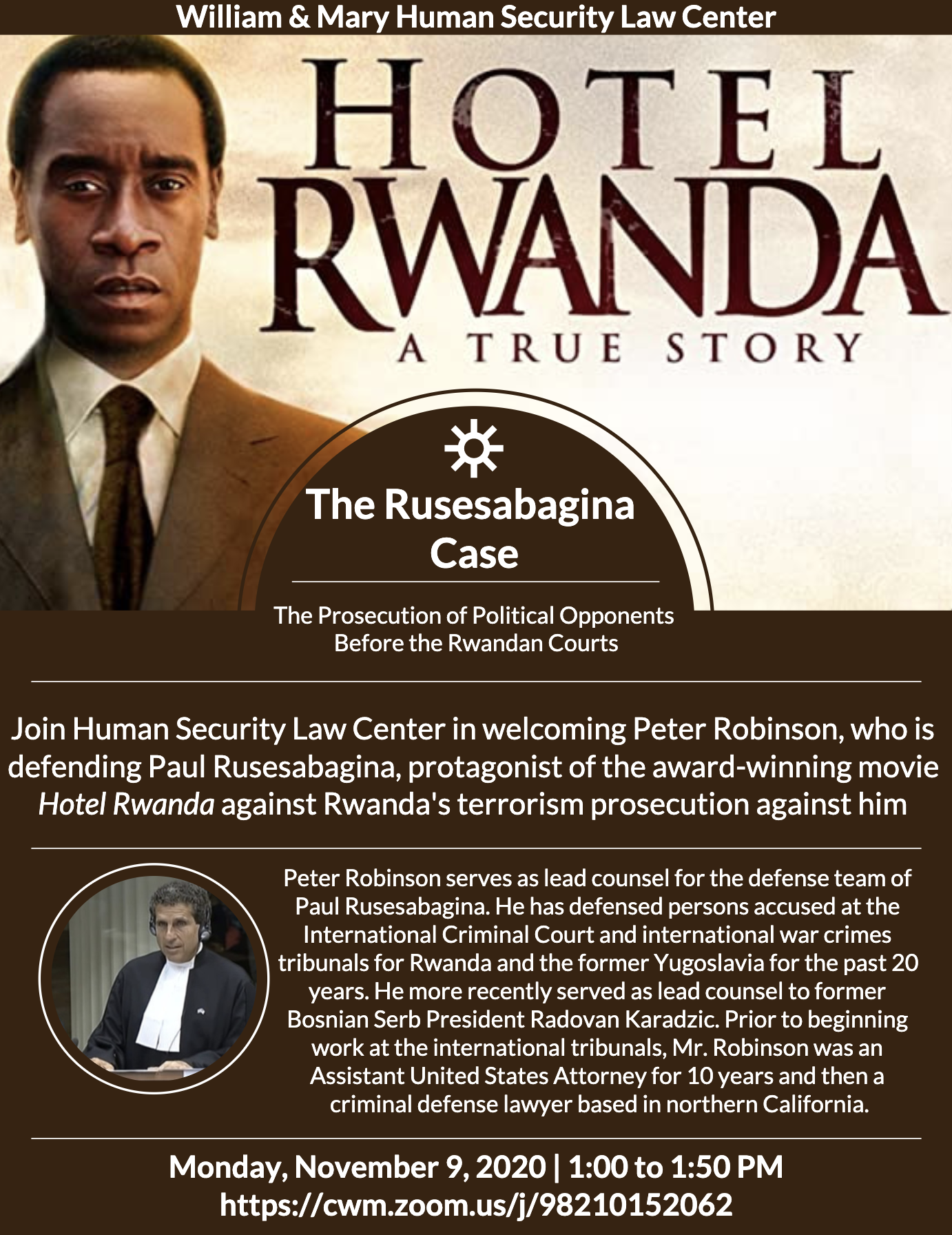
Syria Justice and Accountability Centre: Universal Jurisdiction, Prosecution of Syrian War Crimes, and Upcoming Trial of the Beatles
In September 2020, the Human Security Law Center had the privilege of welcoming Roger Lu Phillips, the Legal Director of the Syria Justice and Accountability Centre as a distinguished lecturer. He leads SJAC's efforts in support of Universal Jurisdiction prosecutions of Syrian war crimes as well as the organization's data analysis and documentation teams. He was a UN legal officer for ten years at the Khmer Rouge Tribunal and the International Criminal Tribunal for Rwanda. He has published and taught subjects regarding international humanitarian law and the prosecution of atrocity crimes, currently as an Adjunct Lecturer at Catholic University’s Columbus School of Law. He is a graduate of American University’s Washington College of Law and a member of the D.C. and Colorado Bars. His most recent publication (with Layla Abi-Falah, '20), Criminal Responsibility for the COVID-19 pandemic in Syria, will be published in the Columbia Human Rights Law Review in February 2021.
2019-20 Academic Year
International Career Panel
The Human Security Law Center co-hosted an International Career Panel with the Center for Comparative Legal Studies and Post-Conflict Peacebuilding and the Office of Career Services in November 2019. The Panel featured: Maryann Chong, '07, Deputy Manage for Operations at USAID's Office of U.S. Foreign Disaster Assistance (OFDA), Michael Dick, '06, Former U.S. DOJ at Department of International Affairs; Masha Kalinina, '11, Officer at the Pew Charitable Trusts, and Evan Frauhiger, '18, Program Associate in the International Programs Division at the National Center for State Courts.
Mass Atrocity Trials
On Thursday, October 17th, the Human Security Law Center had the pleasure of welcoming Artur R. Traldi as a distinguished lecturer for a discussion on Mass Atrocity Trials. Mr. Traldi, a graduate of the College of William & Mary and Georgetown University Law Center, will speak from his extensive experience in international justice and international, criminal, and human rights law. As a prosecutor at the International Criminal Tribunal for the former Yugoslavia from 2010 to 2017, Mr. Traldi worked on international cases at the investigative, pre-trial, trial, judgment, and appeal stages. Notably, from 2014 to 2017 he led the team responsible for prosecuting the component of the case against Ratko Mladić, the commander of the Main Staff of the Bosnian Serb Army, for crimes committed during the ethnic cleansing of 14 municipalities. Mladić was convicted of crimes including persecution, mass murder, and mass expulsions on this component of the case. Prior to his work in Yugoslavia, Mr. Traldi served at the International Criminal Tribunal for Rwanda; worked as an expert with the OSCE Mission to Bosnia and Herzegovina; been seconded by the State Department to OSCE election observation missions in Albania, Azerbaijan, Georgia, and Ukraine; trained prosecutors and judges litigating very serious crimes in a dozen different countries, and clerked for Justice Debra Todd of the Pennsylvania Supreme Court and Judge Arthur Zulick of Monroe County.
2018-19 Academic Year
HSLC 2018 Symposium: Gender Equality in Elections
The Human Security Law Center welcomed experts for a discussion of “Gender Equality in Elections” in October 2018. Learn more.
The New State Solution: A Conflict Ending Alternative to the Israeli-Palestinian Status Quo
Also in October 2018, the Human Security Law Center welcomed Brigadier Generalamior Avivi as a distinguished lecturer for a discussion regarding a new state solution to the Israeli-Palestinian conflict.
Film: The Destruction of Memory
In November 2018, along with the William & Mary Art & Art History, AMES, Classics, and History Departments, the Human Security Law Center co-sponsored a screening of "The Destruction of Memory" film with Director Tim Slade. Over the past century, cultural destruction has wrought catastrophic results across the globe. This war against culture is not over - it's been steadily increasing. In Syria and Iraq, the ‘cradle of civilization’, millennia of culture are being destroyed. The push to protect, salvage and rebuild has moved in step with the destruction. Legislation and policy have played a role, but heroic individuals have fought back, risking and losing their lives to protect not just other human beings, but our cultural identity - to save the record of who we are. Based on the book of the same name by Robert Bevan, The Destruction of Memory tells the whole story - looking not just at the ongoing actions of Daesh (ISIS) and at other contemporary situations, but revealing the decisions of the past that allowed the issue to remain hidden in the shadows for so many years.
International Dimension of American Criminal Prosecution: Terrorism Prosecutions
In February 2019, HSLC welcomed Professor Wadie Said, Professor of Law at the University of South Carolina as a distinguished lecturer. Professor Said explored the far-reaching domestic effects of the global reach of American criminal law enforcement through its "war on terror" and "war on drugs." Offering a detailed discussion of key statutes that reference this international dimension of domestic, criminal law enforcement, Professor Said discussed the effects that these legal innovations have wrought on the American criminal law system.
My Grandfather's Secret: Declassified Intelligence and WWII-Era
Also in February 2019, the Human Security Law Center welcomed Mr. McKay Smith as a distinguished lecturer for a discussion on his investigations into WWII-Era War Crimes. Mr. McKay Smith is an Attorney with the U.S. Department of Justice, National Security Division. He is also an Adjunct Professor at the George Washington University Law School and the George Mason University School of Law, where he teaches courses on government oversight and internal investigations. Mr. Smith served as a Senate Fellow for John McCain on the Senate Armed Services Committee and conducted complex investigations related to Russian intelligence threats, cybersecurity, and counterterrorism. Prior to joining the Department of Justice, Mr. Smith was a Senior Inspector with the Department of Homeland Security, Office of Inspector General, where he supervised reviews of highly-sensitive national security programs and operations. He worked in multiple capacities within that office, including as an Attorney and as the Acting Intelligence Operations Specialist. Mr. Smith earned an LL.M., with distinction, from the Georgetown University Law Center, a J.D. from William and Mary Law School, and a B.A. from the College of William and Mary
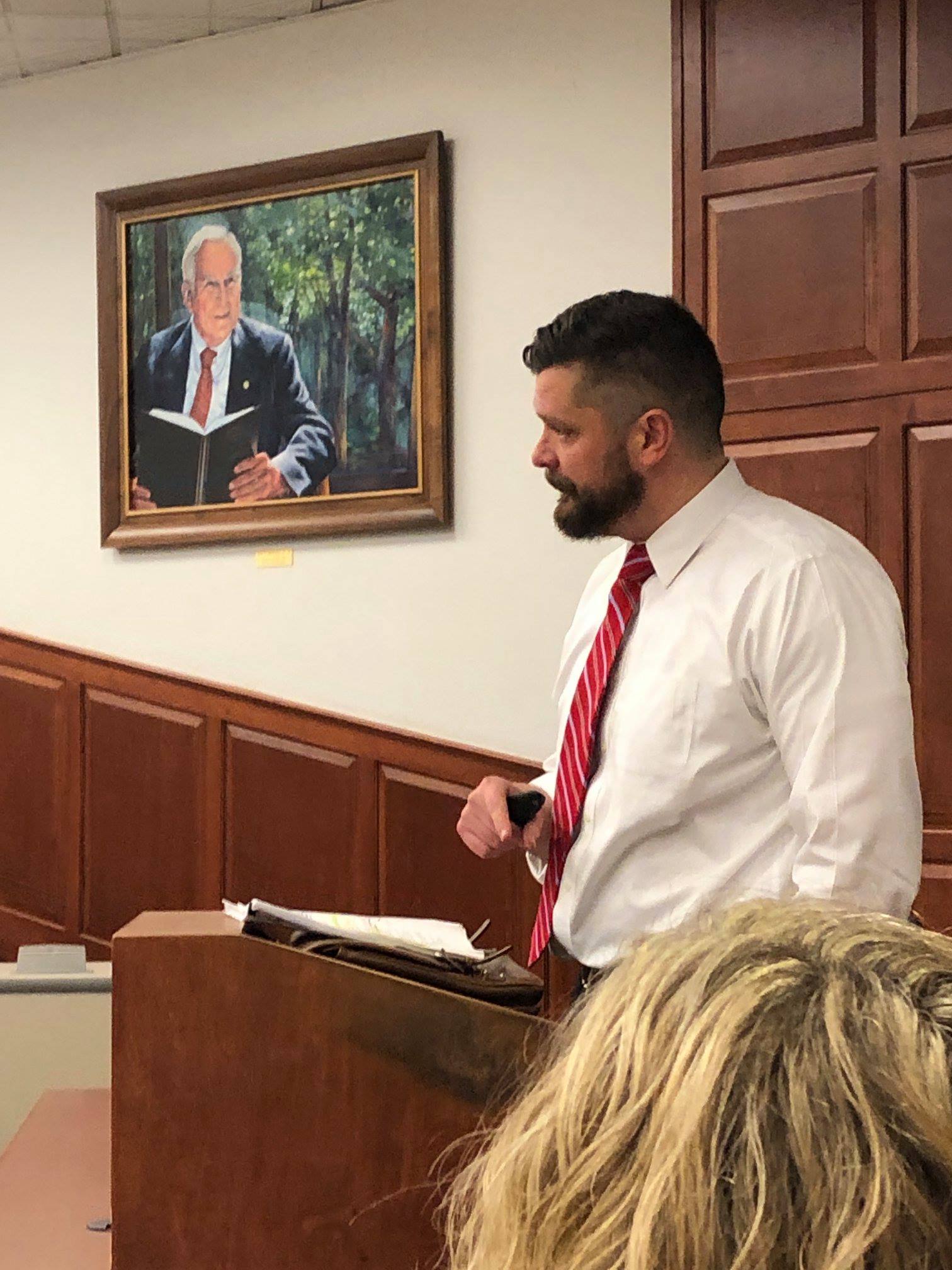
International Careers Breakfast
In April 2019, the Human Security Law Center joined the Office of Career Services in welcoming Colin Buckley, '85, Chief Operating Officer of the CDC Group PLC, London for a breakfast conversation about international development and finance.
2017-2018 Academic Year
U.S.-North Korea Relations: The Threat of Nuclear War
In October 2017, HSLC, in collaboration with the Asian Law Students Association, presented our annual symposium on the threat of a nuclear war between the U.S. and North Korea. The experienced panel consisted of Mitchell Reiss, President and CEO of Colonial Williamsburg Foundation, former Director of Policy Planning, who provides independent strategic advice on North Korea; Hongyu Zhang, Assistant Professor of Government at the College of William & Mary and experienced researcher on nuclear proliferation, East Asian security, and Chinese foreign policy; and John Feffer, Director of Foreign Policy in Focus at the Institute for Policy Studies. The discussion was moderated by Professor Jeffrey Kaplow.





Populations at Risk: Inclusive Standard Setting in Humanitarian Action
In February 2018, HSLC had the privilege of welcoming Janet Lord to our school. Janet Lord gave a presentation about the current work addressing the formulation of standards on disability inclusion in humanitarian action, particularly focusing on protection of persons with disabilities in conflict. Janet Lord is an international human rights lawyer who serves as senior research fellow at the Harvard Law School Project on Disability and independent human rights advisor for UN agencies, non-governmental organizations, and governments.
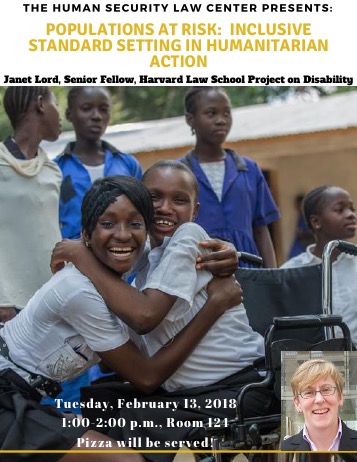
Law of State Secession - Kosovo & Catalonia
In March 2018, HSLC co-sponsored a lunch discussion alongside Professor Malone. Together, we were pleased to welcome back distinguished William & Mary Law School alumni Dr. Charles E. Ehrlich. Dr. Ehrlich spoke on the law of state secession, focusing specifically on Kosovo and Catalonia. He shared his personal experience in the region to provide valuable insight.
2016-2017 Academic Year
In January 2017, HSLC hosted Thomas E. Brzozowski as a distinguished lecturer to discuss domestic terrorism investigations and prosecutions. In the spring of 2017, HSLC hosted former U.S. Ambassador to Belize, Vinai Thummalapally as a distinguished lecturer to discuss US Trade Policies.
Domestic Terrorism Investigations and Prosecutions
Mr. Brzozowski is the Counsel for Domestic Terrorism Matters for the Counterterrorism Section in the National Security Division of the U.S. Department of Justice. Prior to his current position, Mr. Brzozowski was an Assistant General Counsel in the FBI’s Office of General Counsel.
US Trade Policies: Where We’ve Been, Where We Are Going and How to Get Back On Track
Mr. Thummalapally currently serves on the Board of Directors of Cyient Limited. Prior to his current position, Mr. Thummalapally was the former U.S. Ambassador to Belize from 2009 to 2013 and thereafter became the Executive Director of SelectUSA, part of the International Trade Administration of the U.S. Department of Commerce. He has also worked for MAM-Inc., formerly Mitsui Advanced Media, as the CEO and served as the plant manager of WEA Manufacturing Inc., a division of Time Warner Inc.
2015-2016 Academic Year
In the fall of 2015, HSLC hosted Suzannah Linton as a distinguished lecturer to discuss women accused of international crimes. In the spring of 2016, HSLC welcomed former First Chief Prosecutor, Fred Borch, in February. Later that spring, HSLC presented a symposium on the Iran Nuclear Accord.
Symposium: Iran Nuclear Accord: A Stunning Diplomatic Success or a Dangerous Path?
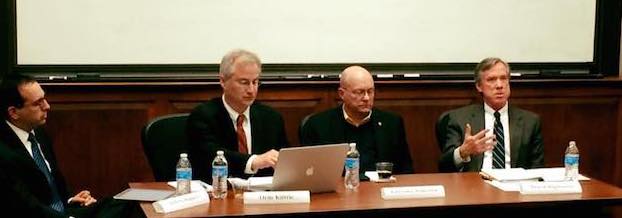
In April of 2016, with sponsorship from the Reves Center for International Studies, HSLC hosted four distinguished experts, including Newell Highmith, Deputy Legal Advisor for the Department of State; Orde Kittrie, Professor of Law at Arizona State University and Former Lead Attorney for Nuclear Affairs for the Department of State; and Lawrence Wilkerson, Adju
Trials of Terrorists by Military Commissions: The Experiences of the First Chief Prosecutor, presented by Fred Borch

Fred L. Borch III presented on his work as Chief Prosecutor for the Guantanamo Bay Military Commissions, discussing his responsibility for directing the overall prosecution efforts of the U.S. in military commissions involving alleged terrorists. He is currently the Regimental Historian and Archivist for the U.S. Amry Judge Advocate General's Corps. Today, he is the only full-time military legal historian in the U.S. Department of Defense.
Mr. Borch was a career military lawyer in the U.S. Army Judge Advocate General's Corps from 1980 to 2005. During that period he served in a variety of legal assignments in the U.S. and overseas, including Professor of Criminal Law at the Army Judge Advocate General's School in Charlottesville, Virginia (1990 to 1993) and Professor of International Law at the naval War College, Newport, Rhode Island (2001 to 2003). He specialized in legal issues involving terrorism, anti-terrorism, counter-terrorism, and homeland security (February 23rd, 2016).
Women Accused of International Crimes, presented by Dr. Suzannah Linton
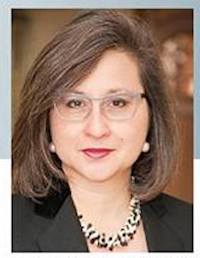
In this presentation at William & Mary, Dr. Linton spoke about her recent academic work on Women Who Commit International Crimes. Her research is bringing to light a matter of global significance that challenges the dominant narrative and raises major challenges across disciplines. Her talk focused on the issue of equality in the criminal justice system, and whether criminal proceedings for international crimes raise particular issues that require women to be treated differently.
Suzannah Linton, is an international consultant to the United Nations Development Programme and a visiting fellow at the British Institute of International and Comparative Law. She has served as a UN Prosecutor for Serious Crimes in East Timor, at the International Criminal Tribunal for the former Yugoslavia and the Claims Resolution Tribunal for Dormant Accounts in Switzerland, and with UN and other international missions in Cambodia, Indonesia, East Timor, Bosnia-Herzegovina, Croatia and elsewhere (November 5th, 2015).
2014-2015 Academic Year
In the 2014-2015 academic year, HSLC hosted four lectures addressing various international human rights and security issues.
Documenting Human Rights Country Conditions in Closed and Repressive Societies. Ms. Lord discussed the difficulties of monitoring human rights abuses in repressive societies. Her work focuses on the rights of marginalized groups, human rights treaty negotiation and implementation, and health and human rights law. Ms. Lord is currently the senior vice president for human rights and inclusive development at the Burton Blatt Institute (BBI) at Syracuse University College of Law where she oversees international legal research and global programming (February 2015).

Defending the Devil: Challenges at International Criminal Tribunals. International criminal defense lawyer Mr. Robinson shared his experience representing alleged war criminals and discussed problems concerning international criminal tribunals. He served as legal advisor to former Bosnian Serb President Radovan Karadzic at the International Criminal Tribunal for the former Yugoslavia as well as many other alleged war criminals. Mr. Robinson is also the author of the legal thriller, “The Tribunal” (January 2015).
ISIS and the Islamic State: The Rise of a Security Threat and the American-led Response. Dr. Masters discussed the history of ISIS, the threat it poses the world and the role the United States plays in addressing that threat. Dr. Masters’ research focuses broadly on international security and specifically on collective action and terrorism, structural theories of terrorism, and foreign imposed regime change (November 2014).

Sex, Laws and Videotape: A Mendicant on the Frontiers of International Justice. Dr. Etcheson shared his experience in Cambodian international tribunals and the peace process after the Khmer Rouge. He also wrote the book, “After the Killing Fields: Lessons from the Cambodian Genocide” (October 2014).
Previous Years
Exploring the Prosecution of Somali Pirates, presented by Benjamin Hatch, Deputy Chief of the United States Attorney’s Office, Criminal Division in the Norfolk branch of the Eastern District of Virginia, sharing his experiences with convicting the three Somali pirates associated with the abduction and murder of four US citizens on The Quest in February 2011.
Investigating the North Korean Gulag: The UN Commission of Inquiry into Crimes against Humanity by the North Korean Regime, presented by Janet Lord, senior vice president for human rights and inclusive development at the Burton Blatt Institute (BBI) at Syracuse University College of Law, explaining the human rights abuses in North Korea with a specific focus on the disabled.
Defining maritime policy: Is there any difference between Greenpeace and Somali pirates?, presented by Professor Goran Sluiter, an professor and international law practitioner from Amsterdam, addressing the current legal doctrine of piracy and sharing experiences of defense work for the Somali pirates.
Distinguished Lecture Series Past Events
Reimagining Child Soldiers in International Law and Policy, presented by Mark Drumbl, Professor of Washington & Lee Law School, addressing how to prevent child soldiering, reintegrate child soldiers, and engage child soldiers in other post-conflict reconciliation reforms (November 15, 2012).
"All Is Fair In Art and War": Confiscation of Cultural Property During Times of Armed Conflict, panel discussion with Dr. Alan Gerson, Ambassador Pavlos Anastasiades, and Marion Werkheiser (March 21, 2011). Click here to read more.
The Consolidation of Democracy in Panama after Noriega, presented by Jaime Alemán, Ambassador to the United States from the Republic of Panama (January 14, 2010).
Panel: Protecting America Post-Guantanamo, co-hosted by Human Rights First, and featuring a group distinguished retired military leaders addressing the national security benefits of closing the Guantanamo Bay prison facility (November 19, 2009) .
The Role of National Human Rights Institutions in Europe, presented by Julie Mertus, Professor and Co-Director of the MA program in Ethics, Peace and Global Affairs at American University (November 16, 2009) .
Panel: International Human Rights, featuring Rashida Manjoo, United Nations Special Rapporteur on Prevention of Violence against Women; Janet Lord, Blue Law International; and Michael Stein, William & Mary Law School (October 27, 2009) .
Enemy of the State: The Trial and Execution of Saddam Hussein, presented by Michael Newton, Professor at Vanderbilt University Law School, who helped lead international law experts who prepared the judges and prosecutors of the court that tried Saddam Hussein (October 22, 2009).
The West Bank: Conflict, Human Rights and the Rule of Law, presented by Hussein Abu El Hawa, Senior Legal Education Coordinator of the NETHAM Rule of Law Project, and Dr. Mohammad Shalaldeh, Dean of Al-Quds Law School in East Jerusalem (October 20, 2009) .
Cross Border Transactions in Emerging Markets, presented by Peter Belk, President and CEO of Atlas International Partners LLC, an investment advisory firm focusing on middle market opportunities in emerging markets (October 19, 2009) .
Global Warming: A Second Coming for International Law?, presented by Deepa Badrinarayana, Professor at Chapman University School of Law (September 30, 2009) .
Diagonal Regulation and Climate Change, presented by Hari Osofsky, Washington and Lee University Law Professor, exploring the need for climate regulation at all levels of government to address the effects of greenhouse gas emissions (September 2, 2009) .
The Current State of Negotiations between Greece and Turkey with respect to the Republic of Cyprus, address by the Honorable Ambassador Andreas S. Kakouris, Ambassador to the United States from the Republic of Cyprus (November 3, 2008).
American Values & National Security: Does Torture Keep Us Safe? Cosponsored by the Campaign to Ban Torture, this panel discussion featured a retired military leader, an intelligence expert, and a local faith leader (October 27, 2008).
Why Torture Does Not Work: A Military Perspective, a roundtable discussion co-sponsored by Human Rights First, of high-ranking military officers who have spoken out against the use of torture and coercive techniques of interrogation (October 6, 2008) .
An International Holistic Approach to Dealing with Global Warming, presented by Pep Fuller, former Senior Representative for Oceana and Counselor for International Affairs at the EPA (October 1, 2008) .
Water Privatization Trends in the U.S.: Issues of Human Rights and National Security, presented by Professor Tony Arnold, Boehl Chair in Property and Land Use of the Louis D. Brandeis Law School (September 16, 2008) .
Privatizing Justice: Representing the Victims of Terrorism and Human Rights Abuses, presented by Dr. Allan Gerson, co-author (with Newsweek Senior Editor Jerry Adler) of the book The Price of Terror: Lessons of Lockerbie for a World on the Brink. Co-sponsored by the George Tayloe Ross Memorial Lecture Series (September 10, 2008).
National Security Law in the 21st Century: A Practitioner's View, presented by Major General Charles Dunlap, Deputy Judge Advocate General of the U.S. Air Force (February 13, 2008).
The Northern Ireland Peace Process: How Pertinent a Model for Other Conflicts? presented by Mitchell Reiss, Professor of Law and Vice Provost for International Affairs, College of William & Mary and President's Special Envoy for the Northern Ireland Peace Process (January 31, 2008).
Atrocity, Punishment and International Law, presented by Mark Drumbl, class of 1975 Alumni Professor and Director of the Transnational Law Institute, Washington & Lee University School of Law (January 23, 2008) .
When, If Ever, Should Torture Evidence Be Admissible? presented by Michael Scharf, Professor and Director of the Frederick K. Cox International Law Center, Case Western Reserve University School of Law (November 1, 2007).
Terrorism and the Convergence of Criminal and Military Detention Models, presented by Robert Chesney, Associate Professor, Wake Forest University School of Law (October 10, 2007).
Human Rights at Stake in the War on Terror, presented by Jordan Paust, Baker Law Center Professor, Law Center of the University of Houston (September 27, 2007).
Seeking Justice in the Military Commissions, presented by Neal Katyal, Professor of Law at Georgetown University (September 15, 2006).
Islam, Human Rights and Democracy, presented by Shirin Ebadi, 2003 Nobel Peace Prize Laureate (January 29, 2006).
Doing Well by Doing Right: Values in American Foreign Policy and the Struggle against Terrorism, presented by Stephen Rickard, acting Director of the Open Society Institute's Washington Office (November 14, 2005).
Detainee Operations in the War on Terror, presented by MG John D. Altenberg, USA (ret.) (November 9, 2005).
Mass Justice for Mass Atrocity: Cautionary Lessons from Post-Genocide Rwanda, presented by Lars Waldorf, Project Leader at the New School's World Policy Institute (October 5, 2005).
America's Role in a Changed World, presented by Gen. Anthony Zinni, USMC (ret.) (September 26, 2005).
Courts and Military Detainees: The Overlooked Virtues of Deferential Review, presented by David A. Martin, Professor at University of Virginia Law School (April 18, 2005).
An Introduction to the Iraqi Special Tribunal: Trying Saddam Hussein, presented by Professor Linda Malone and the students of the 2004 Iraqi Special Tribunal Clinic (April 7, 2005).
Reflections on the War on Terror, presented by John Yoo, Professor of Law at the University of California at Berkeley School of Law (April 4, 2005).
Justice, Judgment and Jurisdiction, presented by Madeline Morris, Duke Law School Professor and director of the Duke/Geneva Institute in Transnational Law (March 29, 2005).
Criminalization of Landmine Use by Illegal Armed Groups and International Law, presented by Luz Nagle, Stetson University Professor of Law (March 21, 2005).
Legal Issues Surrounding the Guantanamo Bay Detention, presented by Erwin Chemerisnky, Duke Law School Alston & Baird Professor of Law. Co-sponsored by the Institute of Bill of Rights (March, 14, 2005).
The New Mercenaries? Law and Policy of the Civilianization of Military Operations presented by Jeffrey K. Walker, Senior Fellow at Georgetown University's Institute for Law and Politics (March 1, 2005).
Bait and Switch: Human Rights and U.S. Foreign Policy, presented by Julie A. Mertus, American University Associate Professor of International Relations (February 18, 2005).
Human Rights in Classical Islamic Law presented by Tamara Sonn, William and Mary Kenan Professor of Humanities (January 25, 2005).
Miscellaneous Events
Symposium: From "Might Makes Right" to "Smart Power": The Shift in the U.S. National Security Strategy and its Global Implications for the Rule of Law
Co-hosted by the International Law Society, Multicultural Law Students Association, the Human Security Law Center, and the Post-Conflict Justice Program (October 16, 2010).
The symposium focused on President Obama's 2010 National Security Strategy and the emphasis it placed on promoting respect for human rights, effectiveness of the criminal justice system, and the rule of law as a means of making the United States more secure.
Salzburg International Nuclear Law Platform Against Nuclear Dangers
Salzburg (PLAGE) held an international expert and NGO conference on "Updating International Law" in Salzburg, Vienna October 20-23, 2005. The conference was prepared in cooperation with John Van Dyke (University of Hawaii) and Michael Geistlinger (University of Salzburg), both international law professors.
Human Security Law Center Director Professor Linda Malone presented What Issues Require Further Development: Focusing on Developing a Comprehensive Liability Regime, Transboundary Equity, Intergenerational Equity, and the International Law Commission Draft on State Responsibility.
For more information: http://www.updatingnuclearlaw.at/
Women and War
Co-hosted by the William and Mary Journal of Women and Law and the Human Security Law Center (February 12, 2005).
The continuing presence of United States military forces in Iraq has greatly heightened American awareness of many of the issues related to armed conflict. It seems that not a day goes by that reporters don't speak about missionary beheadings by terrorists, or politicians don't debate the merits of holding "free" elections in a country wracked with bloodshed.
These issues, and others like them, have been slowly pushed to the forefront of America's discussion circles--and will surely remain there for years to come. In an effort to widen the scope of our national dialogue on armed conflict, the William and Mary Journal of Women and the Law and the Human Security Law Center co-sponsored the "Women and War" symposium of Saturday, February 12th.
Global Terrorism and Its Impact on Sustainable Development
Co-hosted by William and Mary Environmental Law and Policy Review and the Human Security Law Center (February 4, 2005).
In four panels over two days, speakers addressed issues such as the scientific and economic premises for various sustainable growth strategies; the positive and negative results of current environmental policies on communities and individuals; the impact of recent terrorist attacks on growth policies; and improvements to existing environmental and sustainable development policies. In light of 9/11 and the War on Terror, the symposium also addressed the relationship between global security and environmentally friendly development on both a domestic and international level.
